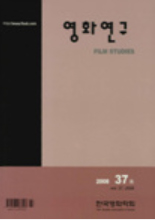- 영문명
- The Birth of North Korean Film and Joo in-gyu
- 발행기관
- 한국영화학회
- 저자명
- 한상언
- 간행물 정보
- 『영화연구』제37호, 383~410쪽, 전체 28쪽
- 주제분류
- 예술체육 > 예술일반
- 파일형태
- 발행일자
- 2008.09.30

국문 초록
영문 초록
This thesis is a study about Joo in-gyu who is known as the founder of North Korean film. After the liberation, the Soviet Army occupied the North of Korean peninsula till the 38th parallel and it changed it fast into a socialist state under the control of the Soviet Union. After this fast change from a colony into a socialist state, the most important thing to be considered is how Koreans who were used to be a Japanese colony, were reborn in a socialist country. Such kind of country reconstruction needed an impressive propaganda, and the best way to instigate people was to make movies. Thanks to the intensive support of the Soviet Union and the North Korean regime, the North Korean film grew up rapidly. In 1946, the North Korea's first film came out, it was a documentary Our construction. By the end of the year, the film making, distribution, and screening were all under the government control. In 1947, the North Korea's first talkie film was made. In the following years in Asia, the North Korean national film studio started to be built. In 1949, the first dramatic film My hometown was made, in 1950 the first color film May first in 1950 was made. Before the 1950-1953 Korean War, the North Korean film started to be active. Joo in-gyu played a prominent part in the North Korean film's success. He has been an actor as well. Immediately after the liberation, he was in charge of the construction of the North Korean film as the head of South Hamgyong prosecution. Also, during the Korean War, as North Korea film's chief, Joo was in charge of the North Korean literary art union's central committee, the chairman of the North Korean film union, the president of the North Korean national film studio, the chairman of the North Korean theater committee. He put under government control all rights about film making, distribution, and screening until he kept his position. However during the Korean War, He has been purged. We couldn't find about him any documentary records after the war. More, in the process of setting up the North Korean film's system, Na woon-gyu, who worked in the opposite side of Joo in-gyu during Japanese colonial period, has been generally appraised. So Joo in-gyu's activities in Japanese colonial period did not receive any attentions.
목차
1. 들어가는 말
2. 해방 당시 주인규의 영화계 위상
3. 북한영화의 건설과 주인규의 역할
4. 6.25전쟁이후 주인규
5. 북한영화의 전통 - 나운규와 주인규의 평가
6. 맺음말
키워드
해당간행물 수록 논문
참고문헌
최근 이용한 논문
교보eBook 첫 방문을 환영 합니다!

신규가입 혜택 지급이 완료 되었습니다.
바로 사용 가능한 교보e캐시 1,000원 (유효기간 7일)
지금 바로 교보eBook의 다양한 콘텐츠를 이용해 보세요!



